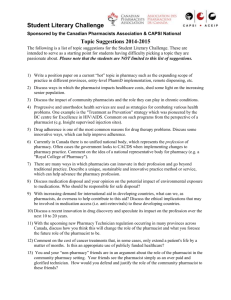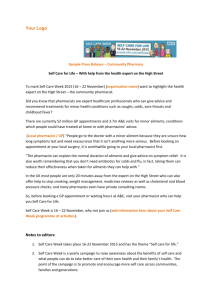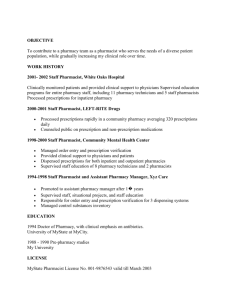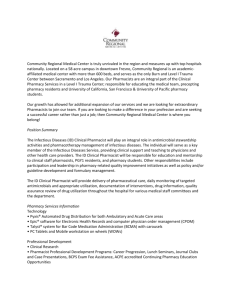The Pharmacist's Right of Refusal in Dispensing Morally
advertisement
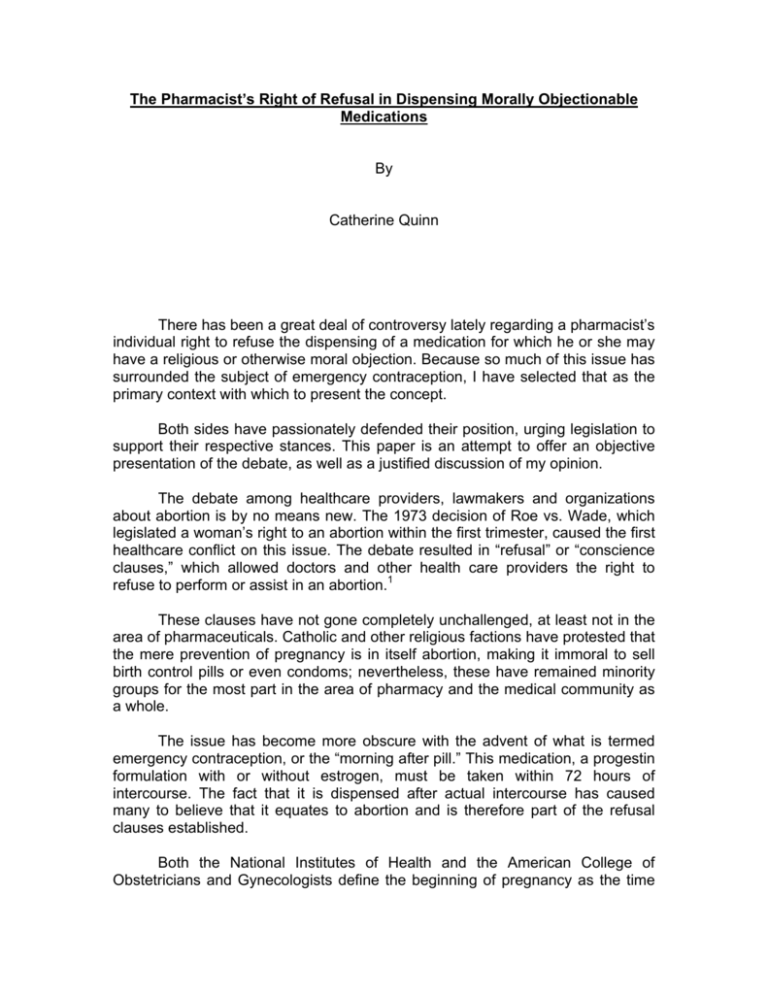
The Pharmacist’s Right of Refusal in Dispensing Morally Objectionable Medications By Catherine Quinn There has been a great deal of controversy lately regarding a pharmacist’s individual right to refuse the dispensing of a medication for which he or she may have a religious or otherwise moral objection. Because so much of this issue has surrounded the subject of emergency contraception, I have selected that as the primary context with which to present the concept. Both sides have passionately defended their position, urging legislation to support their respective stances. This paper is an attempt to offer an objective presentation of the debate, as well as a justified discussion of my opinion. The debate among healthcare providers, lawmakers and organizations about abortion is by no means new. The 1973 decision of Roe vs. Wade, which legislated a woman’s right to an abortion within the first trimester, caused the first healthcare conflict on this issue. The debate resulted in “refusal” or “conscience clauses,” which allowed doctors and other health care providers the right to refuse to perform or assist in an abortion.1 These clauses have not gone completely unchallenged, at least not in the area of pharmaceuticals. Catholic and other religious factions have protested that the mere prevention of pregnancy is in itself abortion, making it immoral to sell birth control pills or even condoms; nevertheless, these have remained minority groups for the most part in the area of pharmacy and the medical community as a whole. The issue has become more obscure with the advent of what is termed emergency contraception, or the “morning after pill.” This medication, a progestin formulation with or without estrogen, must be taken within 72 hours of intercourse. The fact that it is dispensed after actual intercourse has caused many to believe that it equates to abortion and is therefore part of the refusal clauses established. Both the National Institutes of Health and the American College of Obstetricians and Gynecologists define the beginning of pregnancy as the time when the fertilized egg is implanted in the uterine wall.2 Pregnancy typically begins about twelve days after conception, after the blastocyst has fully implanted itself in the lining of the womb. Abortions are defined as medical interventions after pregnancy (according to the above definition) begins. They therefore conclude that emergency contraception and the IUD are not abortifacients, but rather prevent pregnancy from developing.3 While many healthcare providers reject the belief that the prevention of pregnancy itself is an abortion, there is a sizeable group who would argue that life begins at the time of fertilization, not the time of implantation. In all fairness to those against emergency contraception or “Plan B” (Preven), going so far as to argue that a fertilized egg is not yet alive is a slippery slope. But is its mere existence a pregnancy? The Columbia Encyclopedia defines pregnancy as the “period of time between fertilization of the ovum (conception) and birth, during which mammals carry their developing young in the uterus.”4 The first part of the definition seems to suggest that fertilization itself equates to pregnancy, but the second half qualifies it more as an event that follows implantation. Dorland’s Illustrated Medical Dictionary states that pregnancy is “the fecundation [impregnation or fertilization] of the ovum.”5 This clearly supports the argument that Plan B is an abortefacient, and is an actual medical definition rather than a layman’s term. There is no clear-cut answer to the definition of pregnancy, as interpretations vary even within different sources of medical terminology. This gray area confirms that while not all agree on the issue, an actual dilemma does exist for many who are practicing pharmacy. One more facet in the semantics argument is that Plan B’s primary mechanism is in preventing ovulation, meaning there should not be a fertilized ovum at all. It would thus seem that pro-life pharmacists are misinformed in debating the possibility of abortion by expelling a fertilized ovum, but this too is a cloudy issue. Pro-life pharmacists are actually correct in their argument. There are rare occasions, such as when the woman happens to already be ovulating at the time of intercourse, when the medication would instead prevent implantation rather than ovulation. Medical doctors have faced similar dilemmas, though their rights have been more specifically protected in refusing to provide certain types of medical care. In Compassion in Dying vs. State of Washington, the first physicianassisted suicide case to be decided, the court ruled that physicians not only have the right to prescribe life-ending medications to competent terminally ill adults, but they also have the right to refuse such participation. Incidentally, other healthcare professionals who participated were also said to be protected, though the law never specifically stated that they also had the right to refuse. It has been presumed that pharmacists are also protected (nurses have been protected under that legislation), but this has not yet been tested.6 Physicians are also not 2 required to give abortions or dispense birth control pills. In fact, in the case of abortion they are not even required to provide their patient with a referral. The American Pharmacists Association compromises on the issue, with its House of Delegates establishing policies on drugs such as Plan B back in 1998. APhA’s policy supports the ability of a pharmacist to opt out of dispensing a prescription or providing a service for personal reasons, and also supports the establishment of systems so that the patient’s access to appropriate health care is not disrupted. In sum, its policy supports a pharmacist “stepping away” from participating but not “stepping in the way” of the patient accessing the therapy.7 The most updated summary of laws and bills governing pharmacist refusals is summarized in the illustration below, updated to October of 2005. Michigan is among the states shown that has a bill pending to allow pharmacists or pharmacies to refuse to fill prescriptions based upon their personal beliefs.10 National Women’s Law Center, 2005 In the past six months a total of fourteen states have considered "conscience clauses" that would allow pharmacists to opt out of dispensing drugs to which they have ethical objections. Previous to 1998, no state board of pharmacy had adopted a conscious clause in the pharmacy laws. The first state to do so was South Dakota. 3 Several bills have been proposed, including one that supports APhA’s approach to prevent barriers to the patient. Nevada’s new law, signed by the governor in June of 2005, requires that a refusing pharmacist transfer the prescription to another pharmacy at a patient’s request. Two California bills require pharmacists’ employers to establish adequate protocols to ensure that patients have timely access to prescribed drugs when a pharmacist refuses. A Missouri bill states that employers must reasonably accommodate a pharmacist’s objections; however, they are not obliged to accommodate the pharmacist if it places an “undue hardship” on any patient. Bills in California and Missouri require refusing pharmacists to notify their employer in advance if they have any moral or religious objections. Other rulings have not been so diplomatic. In February 2005, Wisconsin Administrative Law Judge Collen Baird ruled that a pharmacist who refused to fill or transfer a college student's prescription for birth control "fell far short of satisfying the standard of care" required of pharmacists based on the Pharmacists' Code of Ethics. Despite that, at the time of Baird’s statement, Arkansas, Mississippi and South Dakota had laws permitting pharmacists to refuse to fill prescriptions for contraception. Georgia has also passed a similar law. Ironically, Baird’s own state passed a refusal law later that year, though it was short-lived. During the 2004 legislative session thirteen more states introduced legislation that would allow pharmacists to refuse to fill oral contraception. To date, a total of 29 states have introduced refusal laws of some sort. In the 2005 legislative session, Rhode Island and Vermont introduced legislation that would allow a pharmacist not only to refuse to dispense contraception of any kind, but also to transfer the prescription to another pharmacy due to the "religious, moral, or ethical principles held by a health care provider.”9 In 2005 two states (Arizona and Wisconsin) passed refusal bills, though the Governors of both states ultimately vetoed it. In April of 2005 Gov. Bill Owens (R-CO) vetoed a bill that would have required all hospitals (including Catholic ones) to inform rape victims about the availability of emergency contraceptives. Among other concerns, he questioned the constitutionality of forcing religious institutions to engage in speech counter to their principles. The other side of the issue has likewise had some stricter legislation introduced. In April of 2005 Sen. Frank Lautenberg (D-NJ), and Rep. Carolyn Maloney (D-NY) introduced a new bill into congress.8 Called The Access to Legal Pharmaceuticals Act, Lautenberg and Maloney seek to allow an individual pharmacist to refuse to dispense contraception on moral or religious grounds, but with several stipulations. 4 The Act still has the compromise of requiring that another pharmacist at the same pharmacy fill the prescription in a timely manner, but there are other more absolute issues against the trend of refusal. For example, the Act bans pharmacists from attempting to harass or humiliate any patient attempting to fill a prescription. It also bans them from refusing to transfer the prescription elsewhere, refusing to return it to the patient, or otherwise deterring them from having the prescription filled. If the bill becomes law it would override state legislation, giving pharmacists "wider discretion" to refuse to dispense certain medications.11 One detail of the Act that I admit was rather confusing was the stipulation that pharmacies that regularly stock prescription contraceptives would also be required to order "without delay" emergency contraception if a patient requests it. I fail to see how ordering something that must be taken within 72 hours of intercourse is helpful to any patient, nor can I imagine a patient who would request it and come back later to get it. In addition, it allows pharmacies to avoid dispensing the medication by simply claiming that they could not get the medication within the 72-hour time window. Legislating that part of the Act by proving them wrong about the time it would take them to stock the drug would be virtually impossible without a special task force, and that is not likely. Senator Lautenberg teamed up with Senator Barbara Boxer (D-CA) to introduce similar legislation, The Pharmacy Consumer Protection Act. The bill requires any pharmacy that fills Medicare or Medicaid prescriptions to make sure all legal prescriptions are filled quickly, even if a pharmacist personally objects. It does not require that pharmacies carry contraceptives, but it does require prescribed items to be reordered if they are out of stock.12 This is different from The Access to Legal Pharmaceuticals Act, which only requires emergency contraception to be ordered at the patient’s request. There is no doubt that both sides of the debate feel that legislation opposing their respective views is offensive and violates their right to practice as they wish. It is easy to insist that the side supporting Plan B is superior because it supports not just their rights, but the rights of the patient; however, pro-life pharmacists are also concerned about what they perceive to be the life of another patient: the future child that may never be born. It is important to keep this in mind when discussing the cases below that involve pro-life pharmacists; otherwise they may be summarily labeled as heartless or selfish. The media reports continue to grow, but the issue is not a new one. Reports of pharmacists refusing to fill certain prescriptions date back to 1990, but the total number of pharmacist refusal incidents are unknown. A New York Times editorial on April 3, 2005 cites “…180 reports of refusals in a six-month period last year.” As of June 2005, the National Women’s Law Center had tracked reports of incidents in 14 states: California, Georgia, Illinois, Louisiana, 5 Massachusetts, Minnesota, Missouri, New Hampshire, New York, North Carolina, Ohio, Texas, Washington, and Wisconsin. In January of 2004 a rape victim in Texas had three pharmacists at Eckerd Pharmacy refuse to fill her time-sensitive emergency contraceptive prescription. It was a rural area, and the woman had difficulty in finding a pharmacy to dispense the drug. She was finally able to get the drug two days later at the same pharmacy, but due to the delay she missed one dose. Another woman in Texas, this one a married mother of two, was refused routine oral contraception in a CVS pharmacy. She angrily returned with her husband, who was reportedly told that contraceptives are “not right” and “cause cancer.” A New Hampshire woman was refused an emergency contraceptive prescription in September 2004. The pharmacist also refused to transfer the prescription. He reportedly described his religious beliefs to her and chastised her for being “irresponsible.” The patient was ultimately unable to get the medication within 72 hours. In January of 2005 a woman in Milwaukee Wisconsin, already a mother of six, also attempted to have an emergency contraceptive prescription filled. The pharmacist refused and allegedly admonished her in what was then a waiting area crowded with other patients, calling her a murderer and refusing to help her “kill the baby.” The woman left the pharmacy without filling the prescription. She later found out that she was indeed pregnant, and she eventually had an abortion. Another married mother of four was similarly refused; she was trying to prevent a fifth pregnancy after her husband’s condom broke. On September 30 of this year a similar refusal happened to a woman in Missouri. She was at a Target store, and the pharmacist reportedly told her, “I won’t fill it. It’s my right not to fill it.” Target does not support a policy to fill prescriptions for birth control, including emergency contraception. A Planned Parenthood clinic has had reports from dozens of women seeking emergency contraception who were turned away at a Walgreen’s in Anacortes, Washington. On one occasion a pharmacist referred a woman to a nearby anti-abortion "crisis pregnancy" center, instead of another pharmacy. Centers such as where he was referring the patient do not carry emergency contraception. A Kmart pharmacist in Wisconsin refused to fill and transfer a birth control prescription because he "did not want to commit a sin." The pharmacy director eventually filled the prescription two days later. This pharmacist is now on trial for violating the state's Regulation and Licensing Department's standards of care. 6 A 2004 survey of more than 900 Arizona pharmacies found that less than half keep emergency contraception drugs in stock, with most saying that there is too little demand; however, some cite moral reasons, according to the Arizona Family Planning Council. Of those who actually stock the drug, a patient will still not get her prescription filled if the pharmacist on duty is morally or religiously opposed to it. 13 In a Drug Topics cover story, the majority (82%) of pharmacists surveyed believe that an owner-pharmacist has the right to deny an abortifacient drug based on the fact that the owner should have a right to decide what to stock and dispense to patients. Great Britain has also had a number of refusals, often based on asserted Catholic beliefs. According to my interpretation of the Pharmacist’s Pledge of Professionalism, refusing to dispense any medication for moral reasons violates several oaths. To begin with, in many states it violates the oath to obey the laws governing the practice of pharmacy. Unless specifically stated, most states that have no laws prohibiting refusal only allow it under conditions of patient safety, not personal beliefs.14 The 1994 APhA Code of Ethics for Pharmacists states that “A pharmacist respects the covenantal relationship between the patient and pharmacist.” A pharmacist who refuses a prescription could easily be seen by the patient as violating their trust and not committed to their welfare. Of course, pharmacists also see themselves as committed to the future child’s welfare, but the presenting patient is nevertheless deemed as being in “second place” in such a scenario. The second oath in the APhA code promises to “…promote the good of every patient in a caring, compassionate, and confidential manner.” Some of the examples above blatantly violated this by lecturing, berating and otherwise chastising patients, sometimes in the presence of several other patients. This means that they also went on to commit HIPAA violations by breaching patient confidentiality. The next oath promises to respect the autonomy and dignity of each patient. The promise regarding the patient’s dignity has already been addressed above. Autonomy is a concept that was included in the code in response to the growing trend to make the patient an active participant in his or her healthcare team. It assumes that most patients are capable of understanding their medical options and assisting in guiding treatment. The belief in the right to refusal is not so much based on a lack of belief in the patient’s autonomy, but in the value of beneficence on the part of the pharmacist. They wish not to do harm to the future child. The problem with that good intention is that the pharmacist’s principle of beneficence is being fulfilled at 7 the expense of the patient's autonomy. The pharmacist is presuming to know what is best and taking on a parental role. The next oath states that the pharmacist will respect the values and abilities of colleagues and other health professionals. It goes on to explain that when appropriate, a pharmacist will ask for the consultation of colleagues or other health professionals, or will refer the patient. It states that a pharmacist acknowledges that colleagues and other health professionals may differ in the beliefs and values they apply to the care of the patient. Some of the previously discussed cases either inappropriately referred their patient or failed altogether. While it seems likely that all of the pharmacists who refused to fill prescriptions acknowledged the differing beliefs and values of the physicians who wrote those prescriptions, they did not respect those differing values in cases where they insulted or humiliated the patient. The next oath is as follows: “A pharmacist serves individual, community, and societal needs. The primary obligation of a pharmacist is to individual patients. However, the obligations of a pharmacist may at times extend beyond the individual to the community and society. In these situations, a pharmacist recognizes the responsibilities that accompany these obligations and acts accordingly.” One could argue that one such responsibility to society would be to provide the healthcare that has been legislated as appropriate to have access to, including emergency contraception. The final oath is that the pharmacist will seek justice in the distribution of health resources. Any pharmacist who refuses to sell routine oral contraception, or someone who refuses to dispense emergency contraception due to Catholic beliefs, are likely to be violating this oath. In the vast majority of such cases, the pharmacies where they practice sell condoms. This means that they are offering men better access to contraception, a clear imbalance of gender-biased access. On a more general scale, there are other negative ramifications in the refusal to fill prescriptions. These include increased numbers of abortions. Unwanted pregnancies are another possibility, and they carry a host of further possible ramifications: higher rates of abuse, neglect, and a lower quality of life for the future child who may now be born to someone who is either not ready or will never be equipped to raise a child. It also results in the revictimization of rape survivors, who are not in the proper mental state to seek a pharmacy who will dispense the drug, and who may even have gone on to either have an abortion or give birth to the rapist’s child. On a professional level, it is probably easy for either side of the debate to admit that the behavior of some of the pharmacists cited above did nothing to advance pharmacy as a profession, for several reasons. On one hand, berating the patient in front of other patients demonstrated a lack of confidentiality that 8 many onlookers probably took into consideration for themselves, perhaps reducing their trust in pharmacists as a whole. Such unprofessional behavior could also have lowered the status and qualification of the pharmacist for anyone who either saw or read about the incident. Pharmacy has struggled in more recent years to be taken seriously as a profession of more than just “lick and stick” or “counting by fives.” The above examples do nothing to further these efforts, and have provoked a number of angry retorts that seem to reflect the traditional, nonmedical role of the pharmacist. Askapatient.com conducted a survey of people’s opinions on this issue. Some of the responses show just how far pharmacists have to go in order to gain professional ground. The question was, “Should pharmacies be required to fill your prescription, even if the pharmacist has moral or religious objections to the potential use of the drug?” Below is a sample of the 865 responses they received: • • • • • It's no different from a cashier refusing to sell you cigs or beer. Absolutely! This is a matter between a doctor and patient. Pharmacists are there to give you your drug. Otherwise they may need to find a new job. Pharmacists are not doctors and are not qualified to decide which drugs we need. Yes, a pharmacist is just that, and not the doctor who knows best. The ignorant behavior of some of these pharmacists will no doubt provoke such responses. “Shut up and do your job,” is going to be the natural reaction for many. The last important issue in refusing to dispense medications based on personal beliefs is the precedent it sets. Once it has been established that personal belief is the only justification needed, what will legally prevent a pharmacist from dispensing a weight-loss drug to an obese person? What if they are religiously against homosexuality and therefore decide to refuse to dispense drugs to that entire population, including HIV patients? If they are morally opposed to IV drug use, can they refuse to dispense hepatitis medication or controlled substances to a known addict? Ramifications of forcing those morally opposed to dispense such medications also exist, though largely on a more personal level. Such pharmacists will likely feel like a mere employee rather than an active participant in medication administration. It will harm employee morale in some locations. Many will feel morally offended and argue that their religious beliefs are being infringed upon. Lawsuits may even occur in growing numbers. Some have already sued their employees after termination. 9 Indiana pharmacist Karen Brauer sued Kmart for terminating her employment in 1996 after she refused to sign a form stating that she would fill all prescriptions despite her personal beliefs. The lawsuit was filed in 1999 by The American Center for Law and Justice (ACLJ), an international pro-life public interest law firm. Judge Herman Weber ruled in favor of the plaintiff. He ruled that the state conscience statute “is obviously intended to allow an individual who morally or ethically opposes abortion ... to follow the dictates of her conscience and refuse to participate in such procedures." He went on to say that "What is critical ... is the undisputed fact that Micronor [the emergency contraceptive involved in this case] does prevent implantation of a fertilized egg in some cases, and [that the] plaintiff's asserted belief that this process results in abortion…is morally wrong."15 Given the shortage of pharmacists, such legislation may make the shortage even more severe. Terminating employment of offending pharmacists, or forcing them to leave those types of workplaces, will provide vacancies that are already not being filled. It is my opinion that pharmacists should not refuse to dispense any medication on moral and/or religious grounds. A pharmacist is a healthcare provider and patient advocate, just as the physician is. The profession should strive to conduct itself in a more scientific manner, outside the constraints of morality. Of course I am not advocating any behavior for the sake of the patient, but any medication or treatment that is considered a legal alternative must be made available. Having stated my opinion, I am not against the idea of pharmacists being permitted to refer the patient elsewhere for specific drugs and situations, but that needs to be carefully organized first. Pharmacists should be able to offer the patient a reasonable alternative and transfer the prescription for them to a licensed pharmacy that is nearby, accessible, and capable of dispensing the medication in a timely fashion (and within any necessary time windows). If that is not possible, I believe that the pharmacist must simply forego personal belief and provide the medication for them. Perhaps I am being judgmental, but my opinion is this: Allowing a pharmacist to step back and wait for another pharmacist to rush to the pharmacy from home, simply to fill a prescription so they can avoid feeling that they had a part in it, seems childish to me. My belief stems from autonomy and fidelity. I strongly believe that it is the patient’s right to choose to prevent a possible pregnancy, or even to terminate it (though that is another debate entirely). I also have a strong sense of commitment to the patient, who I have promised as a pharmacist to advocate for and provide the best medical care for. While I disagree with the assertion that such pharmacists are “in the wrong line of work,” I do agree that they are practicing in the wrong setting. 10 Perhaps they would be better served practicing in an area where this dilemma is unlikely to occur, such as a long-term care facility. If they feel that strongly about the issue, they should strive to change the law on their personal time. Perhaps they could volunteer or even work for organizations that are attempting to shape legislation on this issue. 11 REFERENCES 1. 2. 3. 4. 5. 6. 7. 8. 9. 10. 11. 12. 13. 14. 15. Pharmacist Conscience Clauses: Laws and Legislation, Updated June 2005; National Conference of State Legislatures Cooper C. “Suit Claims Using Birth Control Pills Is Abortion”; April 24, 2001 http://www.womensenews.org “Emergency Contraception (EC): Birth Control or Abortaficient?” Ontario Consultants on Religious Tolerance, 1999 The Columbia Encyclopedia, Sixth Edition; 2001-05 http://www.bartleby.com/65/pr/pregnanc.html Dorland’s Illustrated Medical Dictionary, 30th Edition, http://www.dorlands.com Stephanie E. Harvey, Ei-Lun Lu, Oscar Rivas and Julie Rodgers; “Do Pharmacists Have the Right to Refuse to Dispense a Prescription Based on Personal Beliefs?” The New Mexico Pharmaceutical Association, http://www.nm-pharmacy.com/body_rights.htm “Freedom of Conscience for Small Pharmacies; Testimony of the American Pharmacists Association”, Submitted to the House Small Business Committee July 25, 2005 Dailard C. “Beyond the Issue of Pharmacist Refusals: Pharmacies That Won’t Sell Emergency Contraception”; August 12, 2005; The Guttmacher Report on Public Policy Policy Update - March 2005; “The Sexuality Information and Education Council of the U.S.” (SIECUS) http://www.siecus.org/policy/PUpdates/pdate0163.html#headline “Stop Pharmacy Refusals” Project; National Women’s Law Center, 2005 http://www.nwlc.org/pdf/NWLCPharmacyRefusalsMap10-05.pdf U.S. Lawmakers Introduce Legislation Requiring Pharmacies To Fill All Prescriptions, Including Contraceptives; Daily Reports, The Henry Kaiser Family Foundation http://www.kaisernetwork.org/daily_reports/rep_index.cfm?hint=2&DR_ID=29373 Senator Boxer Proposes Bill to Require Pharmacies to Fill All Prescriptions; April 26, 2005, Feminist Daily News Wire Target Pharmacist Refuses to Fill Emergency Contraception Prescription; Planned Parenthood Court Watch http://www.saveroe.com/node/1714 Pharmacist’s Pledge of Professionalism; Fall 2005class presentation, Pharmacy Ethics and Professional Responsibility Pharmacists Fired for Pro-Life Views Gets Legal Victory; January 23, 2001; American Center for Law and Justice 12

